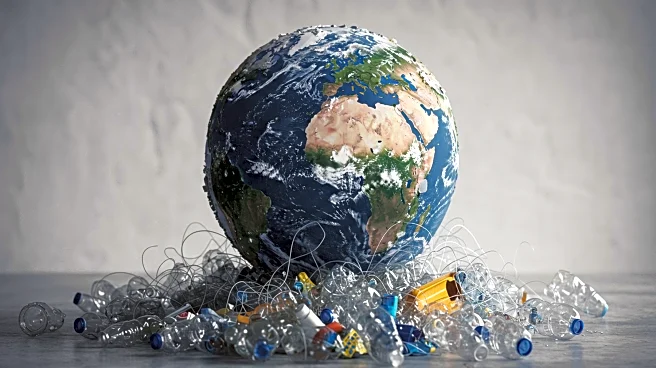What's Happening?
Negotiations at the United Nations office in Geneva aimed at finalizing a legally binding global treaty to address plastic pollution have concluded without reaching an agreement. Delegates from 184 countries were unable to agree on two draft texts presented by Luis Vayas Valdivieso, the chair of the negotiating committee. The primary points of contention include whether the treaty should impose limits on plastic production and enforce global controls on toxic chemicals used in plastics. Despite extended discussions, no consensus was reached, leaving the future of the treaty uncertain. Representatives from small island developing states expressed frustration over the lack of progress, highlighting the disproportionate impact of plastic pollution on their regions.
Why It's Important?
The failure to reach an agreement on a global treaty to combat plastic pollution has significant implications for environmental policy and international cooperation. Plastic pollution is a growing global crisis, with over 400 million tonnes of new plastic produced annually, a figure projected to increase by 70% by 2040 without intervention. The lack of a treaty means continued environmental degradation, particularly affecting vulnerable regions like small island states. The disagreement also underscores the divide between countries advocating for production limits and those, including major oil and gas producers, opposing such measures. This impasse highlights the challenges in balancing economic interests with environmental sustainability.
What's Next?
While no immediate next steps have been decided, the European Union and other countries have expressed a desire to continue negotiations, using the current drafts as a basis for future discussions. The ongoing debate is likely to focus on finding a compromise between limiting plastic production and enhancing waste management and recycling efforts. Stakeholders, including environmentalists and industry representatives, are expected to continue advocating for their positions, potentially influencing future rounds of negotiations. The outcome of these discussions will be crucial in shaping global efforts to address plastic pollution.
Beyond the Headlines
The negotiations reveal deeper issues related to global environmental governance and the influence of powerful economic interests. The resistance from oil and gas-producing countries and the plastics industry to production limits reflects broader tensions between economic growth and environmental protection. The talks also highlight the need for inclusive decision-making processes that consider the voices of affected communities, such as Indigenous leaders and waste pickers, who have been advocating for a treaty that recognizes their rights and contributions.









